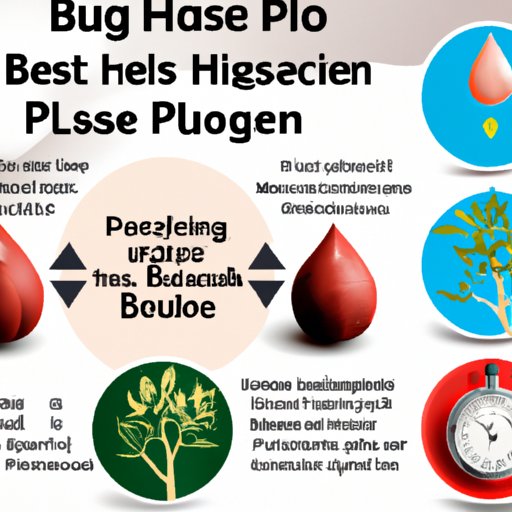I. Introduction
High blood pressure, also known as hypertension, is a common health condition that affects millions of people worldwide. It is often referred to as a silent killer because it can cause serious health problems such as heart disease and stroke without any noticeable symptoms. Managing high blood pressure is crucial for maintaining good health. In this article, we will discuss various lifestyle changes, medications, natural remedies, breathing techniques, and mindfulness practices that can help lower blood pressure.
II. Lifestyle changes to lower blood pressure
Lifestyle plays a significant role in managing high blood pressure. Some of the lifestyle changes that can lower blood pressure include:
A. Reducing salt intake
Excessive salt intake is one of the leading causes of high blood pressure. Reducing salt intake can help lower blood pressure. Experts recommend limiting salt intake to less than 2,300 milligrams per day or one teaspoon of salt per day.
B. Eating a balanced diet
A balanced diet rich in fruits, vegetables, whole grains, lean protein, and low-fat dairy products can help lower blood pressure. Foods rich in potassium such as bananas, avocados, sweet potatoes, and spinach may also help lower blood pressure.
C. Managing stress
Stress can cause a temporary increase in blood pressure. Managing stress through techniques such as yoga, meditation, and deep breathing exercises can help lower blood pressure. It is also essential to identify and avoid stress triggers.
D. Increasing physical activity
A sedentary lifestyle can increase the risk of high blood pressure. Regular physical activity such as brisk walking, cycling, swimming, or jogging for at least 30 minutes per day can help lower blood pressure.
III. Medications used to lower blood pressure
Medications may be prescribed to manage high blood pressure. The most common type of medication used to lower blood pressure are:
A. Overview of common medications
Common medicines used to lower blood pressure include diuretics, ACE inhibitors, ARBs, calcium channel blockers, and beta-blockers. These medications work in different ways to lower blood pressure.
B. How they work
Diuretics help the body eliminate excess water and salt, which lowers blood pressure. ACE inhibitors and ARBs help relax blood vessels, reducing blood pressure. Calcium channel blockers and beta-blockers also work to lower blood pressure by relaxing blood vessels and reducing the heart’s workload.
C. Possible side effects
Medications used to lower blood pressure may cause side effects such as dizziness, fatigue, headaches, and frequent urination. It is essential to discuss your medical history and any chronic conditions with your doctor to determine the most suitable medication to take.
IV. Natural remedies to lower blood pressure
In addition to lifestyle changes and medications, some natural remedies can help lower blood pressure. Here are some examples:
A. Garlic
Studies show that garlic may help reduce blood pressure in some individuals. It contains a compound called allicin that is believed to improve blood flow and reduce inflammation.
B. Fish oil
Fish oil supplements contain omega-3 fatty acids that may help lower blood pressure. The fatty acids can reduce inflammation and improve blood flow.
C. Hibiscus tea
Hibiscus tea contains antioxidants that can help lower blood pressure. Studies show that drinking hibiscus tea daily can lower systolic blood pressure.
V. Breathing techniques to lower blood pressure
Deep breathing exercises can help lower blood pressure by reducing stress and relaxing the body. Here are some simple techniques to try:
A. Overview of deep breathing exercises
Deep breathing exercises involve inhaling deeply and exhaling slowly. Breathing exercises can be done anywhere and anytime and take only a few minutes.
B. Simple techniques to try
One simple technique is to sit in a quiet place, inhale deeply for five seconds, hold your breath for two seconds, then exhale for five seconds. Repeat this process several times, focusing on your breathing.
VI. Mindfulness and meditation for lowering blood pressure
Mindfulness and meditation can help reduce stress, which can positively impact blood pressure. Here are some tips for practicing mindfulness and meditation:
A. How mindfulness and meditation can help reduce stress
Mindfulness involves focusing your attention on the present moment, while meditation involves clearing your mind and focusing on your breath. Both practices can help reduce stress and improve overall well-being.
B. Tips for practicing mindfulness and meditation
Find a quiet place where you can sit or lie down comfortably. Focus on your breathing, and try to clear your mind of any thoughts. If your mind wanders, gently bring your attention back to your breath. Practice mindfulness and meditation for at least 10 minutes per day.
VII. Tracking progress
Monitoring blood pressure regularly, keeping a diary of lifestyle changes and medications, and tracking progress can help identify effective strategies and areas for improvement:
A. Importance of monitoring blood pressure regularly
Tracking blood pressure readings is crucial for maintaining optimal health. Regular monitoring of blood pressure helps to track progress and identify any potential issues.
B. Keeping a diary of lifestyle changes and medications
A diary can help keep track of lifestyle changes such as diet and exercise and medication regimens. This information can help doctors make adjustments to treatment if necessary.
C. How tracking progress can help identify helpful strategies and areas for improvement
Tracking progress can help individuals identify what works and what needs to be improved. Keeping track of lifestyle changes, medications, and blood pressure readings can inform the development of effective strategies to manage hypertension.
VIII. Conclusion
Managing high blood pressure is essential for maintaining optimal health. Lifestyle changes, medications, natural remedies, breathing techniques, mindfulness, and meditation can all be used in managing hypertension. Tracking progress can help individuals identify effective strategies and areas for improvement. We encourage our readers to take action to manage high blood pressure, leading to better health and overall well-being.
